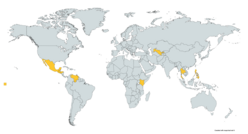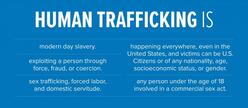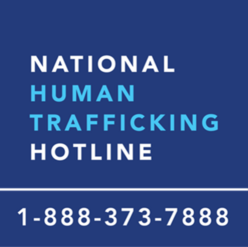For 55 people in metropolitan Phoenix, Human Trafficking Awareness Month is more than an abstraction.
Those 55 are foreign national human trafficking survivors, served in 2019 by the International Rescue Committee (IRC) in Phoenix and its partners in CAUSE (Central Arizona United to Stop Exploitation).

The 55 came from the Philippines, Mexico, Guatemala, Thailand, Kenya, Honduras, El Salvador, Venezuela, and Uzbekistan. Every story is different. Most were women. Most were forced into unpaid labor. Some were sex trafficking victims. A few were children, a few over 60. Most were between 18 and 59. Some spent years as a trafficked person, others a few months.
What each of the 55 survivors in 2019 had in common was support from the IRC in Phoenix. The support included:
- Language interpreting and translation
- Sanctuary in shelters and other housing
- Medical and dental help
- Financial assistance and donations of food and clothing
- Cooperation with police investigation and criminal prosecution
- Referrals to pro bono immigration attorneys
A woman who identifies herself as Bee is a trafficking survivor. She understands what other survivors are experiencing and what’s ahead for them. She came to the U.S. in 2016 from Thailand and was rescued that same year. Bee’s case is an example of how the IRC can help trafficking victims. It is also a tale of Bee’s courage, strength, initiative, and hard work.
Bee was told in Thailand that she would be brought to the United States with no cost to her for transportation. She was told that she’d have a well-paying job. “I was told you don’t need money for travel, don’t need money for food.”
“After I got here everything changed.” Instead of being supported, she was threatened and exploited. “I never touched money,” she says. Money would come to her when she paid off her travel costs, her housing and her food, she was told. The total, they said, was about $50,000, an impossible amount for her.

She was threatened with being turned into immigration authorities, and with losing her visa and passport and being sent back to Thailand. Being beaten was always a possibility.
Bee’s rescue was the result of an intervention by law enforcement. She was among a group of women separated from their captor. Bee had almost no English at the time, however, the officer recognized a trafficking situation and called the IRC. The trafficker was later convicted and sent to prison. IRC in Phoenix staff members talked with all of the women in Thai, got them to a shelter, and a few months later helped them get an apartment.
Bee almost immediately was put in touch with an immigration lawyer, who provided free services. The lawyer helped her get temporary employment authorization. More recently, the IRC helped Bee get a lawyer who assisted her in applying for what is commonly called a T visa, or trafficking visa, which is specifically for human trafficking victims. A T visa allows victims to work in the United States and to bring some family members to the United States. The T visa was extremely important to Bee because of the daughter she’d left behind in Thailand. But the process was slow, and it took two years for her to receive the visa.
“I thank the IRC for helping me and my daughter. I cannot explain the good thing IRC [has done] in helping me,” Bee says.
IRC classes helped Bee learn job-search skills. The IRC placement program helped her to get her first legal job in the U.S., as a housekeeper in a Scottsdale hotel. For Bee, that was a good start, but not where she wanted to be. Her goal was massage therapy, a field she had worked at in Thailand. “That is my favorite job,” she says. She quit the housekeeping job and found a massage job on her own, noted Clara Anne Wagner, Health & Wellness Supervisor at the IRC in Phoenix.
The massage job was not ideal. There were cultural differences and Bee felt she was being forced to work too many hours. When she refused to work one day, she was fired. She found another massage job, one that allowed her to work three days a week. On the other four days she attends massage therapy school, which the IRC helped her find. Within a few weeks she will graduate as a massage therapist and will go back to full-time work.
“She did a lot on her own,” Wagner says. “I feel like the IRC helped her at the beginning. She is so motivated. She did it by herself.” She adds that the IRC also provided major help as she began working to get an attorney to help her with the T visa process.

Once getting her feet on the ground with a job, Bee has strived to be independent. The IRC helped her find the school for the training she wanted, but she is paying for it herself.
“That is a smart lady over there,” Wagner says, pointing at Bee. “She is very self-sufficient.”
For Bee, the IRC in Phoenix has been an invaluable partner. It gave her support when she had no options. It opened doors that she had no idea even existed. She still gets help from the IRC, but she is determined to succeed on her own.
The CAUSE task force that helped Bee and other foreign nationals who are being trafficked is a combination of social service and law enforcement agencies. The partners are Phoenix Dream Center, Streetlight USA, Phoenix Police Department, Federal Bureau of Investigations, Department of Homeland Security, Assistant U.S. Attorneys, and Arizona State University.
Story by Dennis Godfrey, IRC in Phoenix volunteer